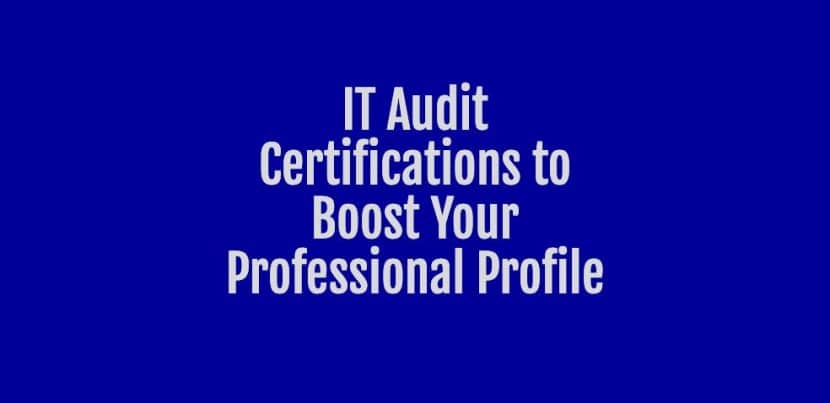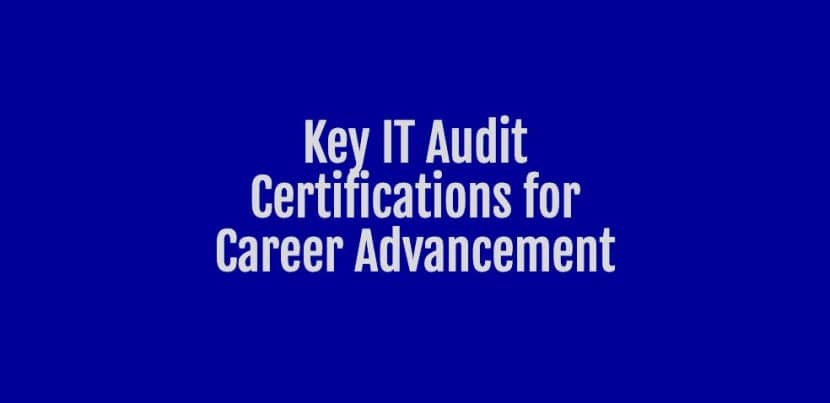- Top IT Audit Certifications
- Choosing the Best IT Audit Certification
- Frequently Asked Questions (FAQ)
- 1. What is the cost of obtaining an IT audit certification?
- 2. Are there any prerequisites for IT audit certifications?
- 3. How long does it take to prepare for the certification exams?
- 4. Can I pursue multiple IT audit certifications simultaneously?
- 5. How do IT audit certifications contribute to career advancement?
- Conclusion
In today’s rapidly evolving digital landscape, organizations heavily rely on technology to drive their operations and achieve their business objectives. The need for robust IT audit practices has become paramount with the increasing dependence on technology. IT audit certifications are crucial in ensuring that organizations have the expertise to assess and manage their IT systems effectively.
Obtaining IT audit certifications can significantly boost an individual’s professional profile and open up a world of opportunities. These certifications validate the knowledge and skills required to perform IT audits, giving auditors a competitive edge in the job market. Additionally, IT audit certifications demonstrate a commitment to professional development and continuous learning, which employers highly value.
By acquiring IT audit certifications, professionals can enhance their career prospects and gain access to a wide range of job roles in various industries. IT auditors with certifications are sought after by organizations looking to strengthen their internal controls, mitigate risks, and ensure compliance with regulatory requirements. These certifications provide auditors with the necessary expertise to identify vulnerabilities, assess risks, and recommend appropriate controls to safeguard critical information assets.
Moreover, IT audit certifications offer professionals the opportunity to specialize in specific areas of IT auditing, such as information security, risk management, or internal control. This specialization allows auditors to deeply understand their chosen domain and become subject matter experts, further enhancing their professional credibility.
Overall, IT audit certifications are essential for IT auditors looking to advance their careers and stay relevant in the ever-changing field of technology. These certifications validate their skills and knowledge and provide them with the confidence and expertise to tackle complex IT audit challenges.
Top IT Audit Certifications
1. Certified Information Systems Auditor (CISA)
The Certified Information Systems Auditor (CISA) certification is widely recognized as one of the most prestigious certifications in the field of IT auditing. ISACA, a globally recognized professional association for IT governance, risk management, and cybersecurity professionals, offers it.
CISA certification is highly valued by organizations seeking professionals with expertise in auditing, controlling, and securing information systems. It validates the knowledge and skills required to assess vulnerabilities, implement controls, and ensure information assets’ confidentiality, integrity, and availability.
To become a CISA, candidates must meet certain eligibility requirements, including a minimum of five years of professional work experience in information systems auditing, control, or security. However, a maximum of three years can be substituted with relevant education or other certifications.
The CISA exam consists of multiple-choice questions that assess the candidate’s understanding of various domains, including IT governance, risk management, information systems acquisition, development, and implementation, and information systems operations, maintenance, and support.
Some of the key topics covered in the CISA exam include:
- IT governance and management
- Information systems acquisition, development, and implementation
- Information systems operations, maintenance, and support
- Protection of information assets
- Business continuity and disaster recovery
Professionals who hold the CISA certification are highly sought after in various job roles and industries. They can work as IT auditors, IT consultants, information security managers, or risk management professionals. Industries such as finance, healthcare, government, and technology heavily rely on CISA-certified professionals to ensure the security and integrity of their information systems.
2. Certified Information Systems Security Professional (CISSP)
The Certified Information Systems Security Professional (CISSP) certification is designed for IT auditors who specialize in information security. Offered by (ISC)², a leading nonprofit organization specializing in cybersecurity certifications, CISSP is globally recognized as a benchmark for information security professionals.
CISSP certification demonstrates an individual’s expertise in designing, implementing, and managing a secure business environment. It covers a wide range of topics, including security and risk management, asset security, security architecture and engineering, communication and network security, identity and access management, security assessment and testing, security operations, and software development security.
Before pursuing CISSP certification, candidates must have a minimum of five years of cumulative paid work experience in at least two of the eight CISSP domains. However, candidates with a four-year college degree, regional equivalent, or an additional credential from (ISC)², can substitute one year of experience.
The CISSP exam consists of multiple-choice and advanced innovative questions that assess the candidate’s knowledge and understanding of the eight domains. It is a rigorous exam that tests the candidate’s ability to apply their knowledge to real-world scenarios.
CISSP certification opens up a wide range of career opportunities for IT auditors. Professionals with CISSP certification can work as security consultants, security managers, security auditors, or information security officers. They are highly sought after by organizations across industries, including finance, healthcare, government, and technology.
3. Certified Internal Auditor (CIA)
The Certified Internal Auditor (CIA) certification is specifically designed for professionals working in the field of internal auditing. Offered by The Institute of Internal Auditors (IIA),the CIA certification is globally recognized and highly respected in the auditing profession.
CIA certification validates the knowledge and skills required to effectively carry out internal audit engagements, assess risks, and provide assurance on an organization’s governance, risk management, and control processes.
To become a CIA, candidates must meet certain eligibility requirements, including a minimum of two years of post-secondary education and a minimum of two years of work experience in internal auditing or a related field. Alternatively, candidates can substitute the education and work experience requirements with other professional certifications or advanced degrees.
The CIA exam consists of three parts, each focusing on different aspects of internal auditing. The exam covers various topics, including internal control and risk management, conducting internal audit engagements, business analysis and information technology, and business management skills.
Professionals who hold the CIA certification are highly sought afterin finance, healthcare, manufacturing, and consulting industries. They can work as internal auditors, risk management professionals, compliance officers, or internal control specialists.
4. Certified Information Security Manager (CISM)
The Certified Information Security Manager (CISM) certification is designed for IT audit professionals who specialize in information security management. Offered by ISACA, CISM is globally recognized as a leading certification for professionals involved in managing, designing, and assessing an enterprise’s information security program.
CISM certification validates an individual’s expertise in information security governance, risk management, incident management, and program development and management. It demonstrates the ability to align information security with business goals and objectives, manage and respond to security incidents, and establish and maintain an information security program.
To become a CISM, candidates must meet certain eligibility requirements, including a minimum of five years of work experience in information security management, with at least three years of experience in three or more of the CISM domains. Alternatively, candidates can substitute work experience with other professional certifications or a relevant degree.
The CISM exam consists of multiple-choice questions that assess the candidate’s knowledge and understanding of the four domains: information security governance, risk management, incident management, and program development and management.
Professionals with CISM certification can pursue various career paths, including information security managers, IT auditors, risk managers, or security consultants. They are highly valued by organizations across industries, including finance, technology, healthcare, and government.
Choosing the Best IT Audit Certification
Choosing the best IT audit certification can be daunting, considering the various options available and the different factors to consider. To help you make an informed decision, let’s compare the key features and benefits of the top IT audit certifications discussed above.
| Certification | Key Features | Benefits |
|---|---|---|
| CISA | Focuses on IT auditing and information systems control Highly recognized in the industry Covers a wide range of IT audit topics | Enhances career prospects in IT auditingValidates expertise in IT governance and risk management Opens up opportunities in various industries |
| CISSP | Focuses on information security management Globally recognized and respected Covers a wide range of security domains | Enhances career prospects in information security Validates expertise in designing and managing secure environments High demand in various industries |
| CIA | Focuses on internal auditing and risk management Globally recognized in the auditing profession Covers various aspects of internal audit engagements | Enhances career prospects in internal auditingValidates expertise in internal control and risk management Opportunities in finance, healthcare, and consulting |
| CISM | Focuses on information security management Highly respected in the IT audit profession Covers information security governance and risk management | Enhances career prospects in IT audit and security management Validates expertise in establishing and managing information security programs Opportunities in finance, technology, and government |
When choosing the best IT audit certification for yourself, consider the following factors:
- Cost: Evaluate the cost of obtaining the certification, including exam fees, study materials, and any additional training required.
- Exam Difficulty: Assess the difficulty level of the certification exam and determine if you have the necessary knowledge and experience to succeed.
- Industry Recognition: Research the industry recognition and reputation of the certification to ensure employers value it in your desired field.
- Career Opportunities: Consider the job roles and industries where the certification is highly sought after and aligns with your career goals.
Ultimately, the best IT audit certification for you will depend on your individual career goals, aspirations, and areas of interest. Choosing a certification that aligns with your expertise and provides the most value in terms of career advancement is essential.
Frequently Asked Questions (FAQ)
1. What is the cost of obtaining an IT audit certification?
The cost of obtaining an IT audit certification can vary depending on the certification body, exam fees, study materials, and any additional training or preparation courses. Generally, the cost can range from a few hundred to a few thousand dollars. It is important to consider the overall investment required, including the potential return on investment in terms of career advancement and increased job opportunities.
2. Are there any prerequisites for IT audit certifications?
Yes, most IT audit certifications have certain prerequisites that candidates must meet before pursuing the certification. These prerequisites may include a minimum number of years of work experience in the field of IT auditing, information security, or a related area. Some certifications may also require specific educational qualifications or other certifications as a prerequisite. It is important to review the eligibility requirements for each certification to ensure that you meet the necessary criteria before pursuing the certification.
3. How long does it take to prepare for the certification exams?
The time required to prepare for IT audit certification exams can vary depending on factors such as the candidate’s prior knowledge and experience, the complexity of the certification, and the amount of time dedicated to studying. On average, candidates may spend several months preparing for the exams, including self-study, attending training courses, and practicing with sample exam questions. Creating a study plan and allocating sufficient time for exam preparation is recommendedto ensure success.
4. Can I pursue multiple IT audit certifications simultaneously?
Yes, it is possible to pursue multiple IT audit certifications simultaneously. However, it is important to consider the time and effort required for each certification and ensure you can dedicate enough resources to effectively prepare for and pass each exam. Pursuing multiple certifications can demonstrate a broader skill set and enhance your professional profile, but managing your time and prioritizing your studies is essential to avoid overwhelming yourself.
5. How do IT audit certifications contribute to career advancement?
IT audit certifications play a significant role in career advancement for professionals in the field. These certifications validate your knowledge and skills in IT auditing, information security, and related areas, making you a more competitive candidate for job opportunities. IT audit certifications demonstrate your commitment to professional development and continuous learning, which employers highly value. Holding a recognized certification can open doors to higher-level positions, increased responsibilities, and better salary prospects. Additionally, certifications provide networking opportunities and access to a community of professionals in the field, which can further contribute to career growth.
Conclusion
IT audit certifications play a crucial role in enhancing professional profiles and opening up new opportunities in the field of IT auditing. These certifications validate the knowledge and skills required to assess and manage IT systems effectively, ensuring the security and integrity of information assets.
By obtaining IT audit certifications, professionals can enhance their career prospects and gain a competitive edge in the job market. These certifications demonstrate a commitment to professional development and continuous learning, which employers highly value. Holding a recognized certification can lead to higher-level positions, increased responsibilities, and better salary prospects.
Among the top IT audit certifications discussed in this article, the Certified Information Systems Auditor (CISA) certification focuses on IT auditing and is highly recognized in the industry. The Certified Information Systems Security Professional (CISSP) certification specializes in information security management and is globally respected. The Certified Internal Auditor (CIA) certification is specifically designed for professionals in internal auditing, while the Certified Information Security Manager (CISM) certification focuses on information security management.
When choosing the best IT audit certification for yourself, consider factors such as cost, exam difficulty, industry recognition, and career opportunities. It is important to select a certification that aligns with your career goals and aspirations and provides the most value in terms of career advancement.
Explore the top IT audit certifications discussed in this article and assess which certification suits your expertise and career aspirations. Remember that obtaining an IT audit certification is a long-term investment in your professional growth and success.
Start your journey towards enhancing your professional profile and expanding your knowledge in IT auditing by pursuing one of these top IT audit certifications. The benefits and opportunities that come with these certifications are invaluable in today’s digital landscape.









